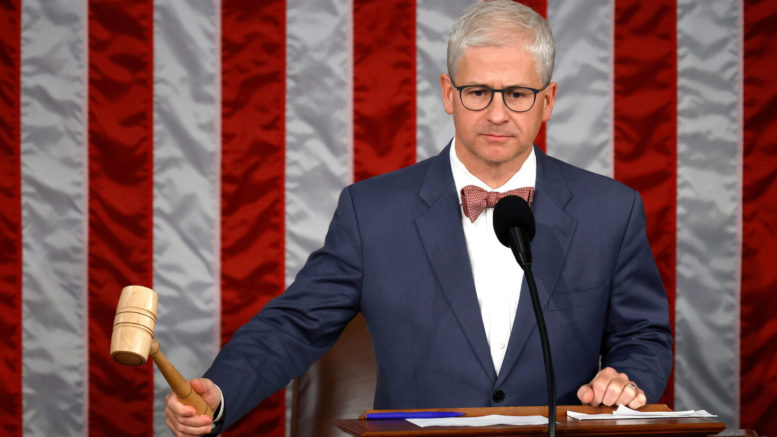House Republicans’ failure to elect a new speaker after Rep. Kevin McCarthy’s ouster two weeks ago has denied the House of Representatives—and by extension, the Republicans who control it—much of their power to govern.
It also likely has denied them something else; namely, their place in the line of presidential succession.
The Constitution anticipates unexpected vacancies in both the presidency and vice presidency. According to the Succession Clause, if the presidency is unexpectedly vacant, the vice president takes over. And if there is also no vice president, then Congress may, by law, set the line of succession among the various officers of the United States.
Many years ago, Congress passed the current succession law, which says that the speaker of the House is next in line after the vice president, and that the president pro tempore of the Senate is next in line after the House speaker.
That means that until McCarthy, R-Calif., got the boot, he was two heartbeats away from being president of the United States.
Without a House speaker, the line of succession skips over the Republican House, and lands in the Democratic Senate. But what if, as some Republicans have recently proposed, the House votes to give the interim speaker, Rep. Patrick McHenry, R-N.C., the full powers of the speaker? Does he then get back in the line of succession?
It’s an untested question—America has never before needed to look beyond the vice president after an unexpected presidential vacancy—but the answer is probably no.
The succession law says that the speaker is next in line after the vice president, but it does not define “speaker.” Is that term limited to the official speaker elected by the House, or does it include appointed and elected speakers pro tempore (Latin for “for the time being”)? The law provides no guidance, but the Constitution does.
The Constitution says that the speaker is the person that the House of Representatives chooses. The members choose through an election. Right now, McHenry is serving as interim speaker because McCarthy appointed him to the position. The House did not choose McHenry. For that reason, McHenry is called the speaker pro tempore and not the speaker.
But if the House votes to give him the full powers of the speaker, is he “chosen” by the House and thus eligible for succession? Still, probably not.
The reason is that formalities matter. If the House calls someone “speaker pro tempore,” he or she is not the speaker. He or she occupies a different role, which, by definition, exists only when there is no speaker.
That may seem overly formalistic. You might argue that if the speaker pro tempore wields all the powers of the speakership, that person is the speaker in the fullness of the constitutional sense, albeit only for a time.
There’s something appealing to that functionalist argument, but it’s probably wrong.
The reason is that the Constitution gives the House the sole and exclusive power to decide who the speaker is.
Three conclusions flow from that: (1) if the House calls someone speaker, he or she is speaker; (2) if the House calls someone “not-speaker,” he or she is not the speaker; and (3) nobody else, judges included, has any say in the matter.
In short, if the House takes the formalist approach to defining the speaker, then the formalist approach prevails. And that is what the House has done.
It’s undisputed that since McCarthy’s ouster, the House has not called anyone “speaker.” And it’s also undisputed that the House thinks speaker pro tempore is a different position than speaker. Because the Constitution gives nobody else a say in the matter, that’s the end of it. A speaker pro tempore is not Speaker.
Unfortunately, that’s not quite the end of our analysis.
What we need to know next is whether the succession law uses the same definition of “speaker” as the Constitution. If the succession law anticipates a functionalist approach, rather than a formalist one, then McHenry might still be in the line of succession.
But there’s no evidence that the succession law uses a meaning different than the Constitution’s. And absent such evidence, we can’t assume that the meaning of a word in a law differs from its meaning in the Constitution.
Besides, the House has been using the Constitution’s definition of speaker since the first day of the very first Congress. There is no evidence that anything has changed.
The takeaway from all this is that McHenry is likely not in the line of presidential succession. No Republican is.
Does it matter? It’s true that no speaker has ever succeeded to the presidency. But it’s good to be prepared. House Republicans are not.
Have an opinion about this article? To sound off, please email letters@DailySignal.com and we’ll consider publishing your edited remarks in our regular “We Hear You” feature. Remember to include the url or headline of the article plus your name and town and/or state.
Original source
#House #Speaker #GOP #Line #Presidential #Succession

